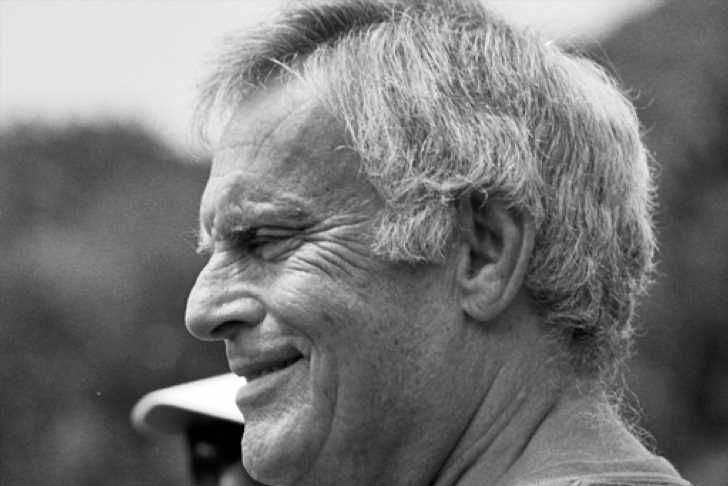
The Peter Principles: What Ralph Lauren’s Executives Learned From Peter Strom
01/22/2021It is a commonly held belief that most designers need a strong executive as a partner to build and sustain a successful fashion business. Ralph Lauren had that with his business partner Peter Strom, and many observers consider the two the gold standard when it comes to designer-executive partnerships.
As former vice chairman, Strom, who died Jan. 8 at age 91, was known for being a whip-smart executive who was tough but kind and had no ego. Along with Lauren, he steered the company through the early days and set the brand up for even greater success.
While industry experts consider some of the best designer/business executive partnerships to be Calvin Klein and Barry Schwartz, and Yves Saint Laurent and Pierre Bergé, observers believe the Lauren-Strom partnership was equally as important.
“We were best friends,” said Ralph Lauren earlier this month. “Peter Strom was always there for me — as a friend and a business partner for over two decades. He liked to say his role was ‘to do all the things I didn’t want to do,’ but he was right there supporting all those things — ‘the magic,’ he called it, and he helped make it happen.”
“He was a tough guy, but had a big heart,” said Jerry Lauren, Ralph Lauren’s older brother who’s a senior consultant and was executive vice president of men’s design at Polo Ralph Lauren. Jerry Lauren said Strom was “the top sergeant,” whom everyone loved. “He was very smart, and he knew the industry. He was like another brother.”

Related Gallery
Louis Vuitton Men’s Fall 2021
Peter Strom courtesy shot.
WWD spoke to people who worked with Strom during his tenure from 1974 to 1995, and asked for the five things they learned from him. Some gave a few more.
What stood out mostly was that Strom invested in his management team, while the conventional wisdom in the fashion industry at the time was that the brand and designer were so strong that management was secondary. His former colleagues said he cared about people in the company, asked questions and listened, had a great sense of humor and treated people with respect and fairness.
“I was always a little afraid of him,” said Joseph Abboud, who was an associate designer of men’s wear in the ’80s. “We didn’t know if he would crack a joke or yell at us. If he liked you, there wasn’t anything he wouldn’t do for you.”
Here’s what Strom’s former colleagues learned from him.
Mindy Grossman, president and chief executive officer of WW, and former president and CEO, Polo Jeans Co.
• Set high expectations and balance toughness and resolve with kindness, warmth and humor.
• Have ultimate respect for and do not compromise as it relates to brand.
• Integrity and character are everything.
• Be curious, ask questions and listen.
• Build and nurture the best team possible.
Buffy Birrittella, executive vice president, senior adviser to Ralph Lauren, senior creative director of Ralph Lauren Womenswear
• Here are the two biggest things I learned from Peter Strom, everything really stemmed from this: One, be real, be a straight shooter…there were never, ever any hidden agendas with Peter…what you saw and heard was what you got. He was unapologetically who he was!
• And two, defuse volatile, tense situations with humor! That was Peter…a lesson unfortunately I am still learning!
• This lesson wasn’t necessarily of course pointed toward me, only observed with great respect: Peter let Ralph be Ralph. He recognized his “genius” (his words, not mine!), so he did not come to Ralph Lauren with an idea about how to “tame” Ralph, how to harness his creativity into a pre-ascribed business model, but create a new business model that built on Ralph’s vision and ideas. In that regard, they were perfect “partners.” He got Ralph’s genius was not just about design, but how to create a brand, how to create the “designer” as a business.
• The partnership between Ralph and Peter, a new template for how the creative side partners with the business side, that no longer exists. Ralph was not a designer for hire, never was, because he never allowed himself to be that way and was in control of his business.
Peter Strom and Ralph Lauren courtesy shot.
Cheryl Sterling, fashion industry consultant, former president and chief operating officer of Ralph Lauren Womenswear
• Know how and when to compromise.
• You don’t grow [a company] without great people.
• The receptionist position, the first person you see who represents the company, is as important as the CEO.
• Know everyone by name. Everyone is important.
• Everyone is entitled to a chance, trust everyone until they give you reason not to.
• Work hard, drink harder, laugh often.
Charles Fagan, chief of staff to Ralph Lauren, executive vice president of Ralph Lauren Hospitality
• Although I was at the beginning of my career when Peter was leading the company with Ralph, from my vantage point he was the definition of a “servant leader,” before the term was widely used in business.
• Peter was obviously sharp, competitive, discerning and capable of all the mechanics it takes to build a company. But what have remained reference points for me throughout my career are his unquestioning belief in Ralph’s instincts and his vision, his commitment to really seeing and supporting people to be their best, the power of humility and that success and happiness don’t require a huge ego.
• Ralph and he shared most of all these qualities and although very different people, were honest with each other, trusted one another and had enormous respected for one another. That’s true partnership.
Victor Cohen, partner at Levin & Glasser PC, former executive vice president, general council at Polo Ralph Lauren
• Be on time (or suffer the consequences).
• My wife is my better half (by far).
• Paying taxes is something to like (means you made some money).
• Just do it! (this was before Nike got into the act).
• Let the other guy win (too).
• Be humble and kind (even if you don’t have to be).
• Have fun.
Karen Rosenbach, managing partner, KLR Global Search, previously senior vice president, human resources and administration at Ralph Lauren
• Working for Peter and watching him, I learned humility, generosity, kindness and humor. Having Peter as a role model unequivocally made me a better HR executive, but [just] as important made me a better human. I also learned the importance of being as comfortable with the driver, the mailman, the barber as with my peers and the board. Peter wouldn’t except anything less.
• Peter intuitively understood what everyone today preaches about building an extraordinary culture. He built a culture based on strong, supportive teams, a family environment, with healthy competition, while doing great business and having a ton of fun. I learned more about building culture from Peter than any trained HR pro.
• In a world that nickels and dimes people, Peter always made sure we paid top dollar. He taught me the importance of paying to attract talent. His philosophy was we pay them and they will then give us their blood, sweat and tears, and that they did. So few people understand the importance of how to attract talent the way Peter did. I always wished that I had perfected his uncanny way of firing someone in the morning and having drinks with them in the evening. How many people could do that?
• He was decisive; funny with a twinkle in his eye; Irreverent, and he left an indelible mark on each and every one of us who were lucky enough to work for him.
• Perhaps the greatest thing I learned from Peter was to forget the rules and intuitively do the right thing, from that he engendered loyalty and an incredible esprit de corps that you rarely see today. He was the epitome of an incredible leader. And in spite of Peter’s many wonderful attributes he was completely ego-less. There was only one Peter Strom.
Joseph Abboud, designer and author and former associate designer for men’s wear at Ralph Lauren
• Complete allegiance to a vision. Peter was impenetrable about ever having doubts about Ralph’s vision. He was a champion.
• His everyday attitude about being a regular guy doing a job. He never had any pretenses. He never played the fashion game.
• Just how aligned he was with Ralph as we saw it. His face to the company and the industry was so supportive of Ralph, there was never a hint of doubt and he never challenged any of Ralph’s vision. He was smart enough to realize Ralph had this extraordinary vision.
• Peter was a people person. He wasn’t touchy-feely, but he was genuine and loyal as they come. It was a family. He read people well and was a good judge of talent. He had these good instincts.
• Every designer craves that kind of relationship. Yves Saint Laurent had Pierre Bergé, Calvin Klein had Barry Schwartz. Peter was Ralph’s alter ego. Without the right partner, it’s hard to get to the pinnacle. It’s hard to do it on your own without a strong business partner who understands who the designer is.
Robert Burke, founder and CEO, Robert Burke Associates, served in various managerial roles at Ralph Lauren
• The importance of the creative process and supporting the designer’s vision.
• The value of brand image and storytelling, without that you are just another brand selling product.
• Introducing yourself, remembering the employees’ names, always asking for input and listening to them.
• The importance of taking a position and leading people to a common goal.
• Realizing that fashion is always moving and changing, and having the ability to reassess and be nimble.
Alexander Vreeland, who is managing the Diana Vreeland estate, formerly senior director of communications at Polo
• Peter believed it was important to pay the senior executives their replacement value. If a person left to work somewhere else, you might need three people to replace them. He believed you should pay the person enough money so they wouldn’t leave.
• He believed it was important to never compete with the designer. He never had his name in the papers, no one knew who he was. Ralph should be the frontman and take credit for everything. Peter didn’t want attention on him and he didn’t want to be quoted. He felt the fashion designer should be the face and the spokesperson for the company, otherwise it confuses things.
• When [your] senior executives travel on business, they should travel business class and stay at really great hotels and have good budgets so they are really comfortable. Since you’re tearing them away from their families, they shouldn’t be scrappy on the road and should feel supported. Also, if you had lunch at your desk, the company should pay for lunch. He felt that an employee puts in the extra hour and more would happen if they didn’t take an hour outside for lunch.
• He was very punctual. Meetings started on time and meetings ended on time. He was at his desk at 8 a.m. He wanted senior people to be in early.
• He kept things very personal. He remembered people’s names and felt at ease. He never had attitude, and was never detached and never secluded. He would walk around the building and show up in someone’s office and ask a question. You felt connected.
• He built the company around Ralph’s strengths and weaknesses. He needed to create a company that would work with how Ralph operates. Sometimes CEOs are rigid about the structure. Peter felt it was important to have flexibilities around Ralph and work with him. Ralph couldn’t make a decision, and production runs and advertising runs would be delayed. Peter had the ability to scramble based on Ralph’s timing.
• Punctuality: Peter believed that being late is a deep sign of disrespect. Peter practiced what he preached and expected the same in return.
• Lose the battle, win the war: Peter was a master at seeing the end goal. He didn’t have an ego that got in the way of reaching that goal.
• Unpretentiousness: Peter did not have a pretentious bone in his body and had little time for people who did. He had the uncanny ability to connect. He not only treated everyone as an equal, Peter believed everyone was his equal.
• Mentorship: Ralph Lauren was an incubator for talent. There has been much lauded about the designer stars who have been mentored by Ralph Lauren. However, under Peter there are hundreds of people who have thrived in other areas of the industry in support of development of brands. There are disciples of his scattered in the U.S. and around the world who either lead companies or hold senior management positions. Perhaps seemingly less “sexy” but none the less equal in importance.
• Communication: This is obvious but with great skill Peter managed the day-to-day operations of the business. The balance between creativity under Ralph and commerce under Peter appeared to be seamless. This was done with endless meetings, phone calls, faxes, Xeroxes, calculators and airplanes. Unlike today where technology provides no excuses for poor communications. Most of all Peter not only listened but he heard and taught those lucky enough to be around him the same.
Nancy Chilton, chief external relations officer, The Costume Institute at The Metropolitan Museum of Art, former senior director of publicity at Polo Ralph Lauren
• Be tough.
• Be kind.
• Be careful.
• Be a team player and a team leader.
• And always have a sense of humor.
Wendy Gerber, CEO, International Consulting Group, former head of marketing and communications at Ralph Lauren
• A great partnership is founded on trust, not similarity. Peter and Ralph couldn’t have been more different, but those differences created a perfect combination to drive the business forward.
• It takes a creative visionary and a strategic executer to drive exponential business growth. The whole is greater than the sum of its parts.
• The importance of unity. While I’m sure they occasionally disagreed privately, Peter and Ralph were a united front at the company — to employees, the press and the public.
• Before the words “lean in” were part of our lexicon, Peter was inspiring us to do it. Peter gave people room to grow and “lean in” to drive innovation and growth. And inspired us to do the same with our teams.
• Share your ideas with passion, and make sure you have metrics to back them up.
FOR MORE STORIES:
Peter Strom, Former Vice Chairman of Ralph Lauren, Dies at 91
Source: Read Full Article



